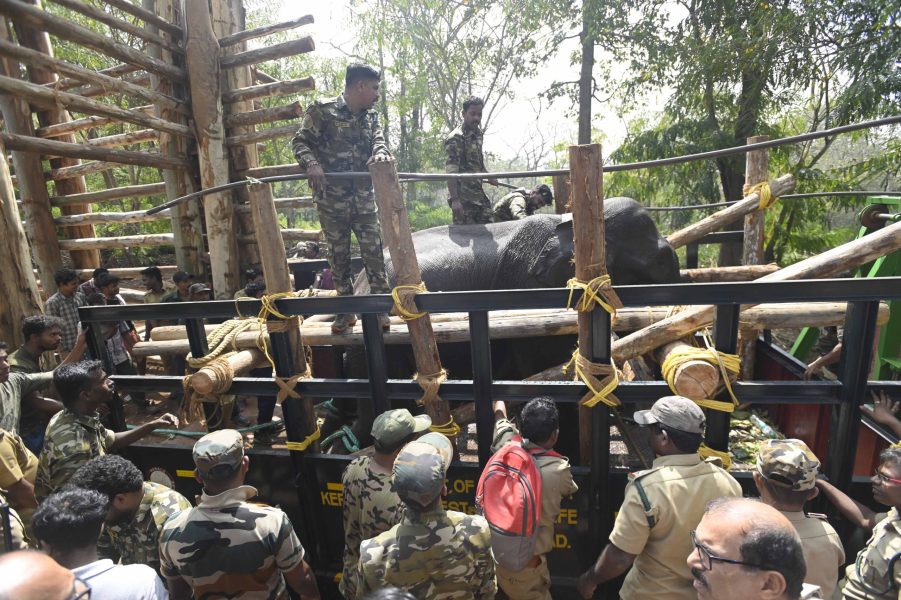
Regulated harvest of tigers, elephants need of the hour: Madhav Gadgil
In an exclusive interview with The Federal, the ecologist explains how regulated harvesting of wildlife can control their population and protect forest dwellers from wild animals

At a time when Kerala is reporting rising instances of tiger and elephant attacks on human settlements close to forests, Prof Madhav Gadgil, the chairperson of the Western Ghats Ecology Expert Panel, says regulated harvest of the “marauding” species is the need of the hour. In a conversation with The Federal, Gadgil explains how the Wild Life Protection Act denies humans the right to defend themselves from animal attacks, and why India should follow in the footsteps of European and Scandinavian nations in legalising hunting.
Excerpts from the interview:
In view of the rise in human-animal conflict, culling is one of the options considered by the Kerala government to regulate population of wild animals. How do you look at this situation?
I don’t thing culling is the right word to use here. Population of wild animals will keep increasing if there are no regulatory factors, say like wildfire, to keep it in check. Similarly, the population of tigers and elephants will keep increasing unless there is harvesting, predominantly in the form of hunting by humans. In India, until 1972, there was large scale hunting of wild animals including tigers, elephants and lions.
There should be national parks and wildlife sanctuaries to protect these wild animals from hunting and allow their population to proliferate. But, these animals will escape when their population exceeds the carrying capacity of wildlife sanctuaries or national parks. This is apparently what is happening in the case of tigers. At this juncture, they should be harvested in a controlled manner.
Also read: Man-animal conflict in Kerala: State may move SC with animal birth control plea
Scandinavian countries like Norway, Sweden and other European countries have realised that wild animals are renewable resource and should be utilised through regulated harvest. In Sweden and Norway, the local communities are empowered to decide how to carry out the harvest. These countries adopt a truly rational approach towards wildlife protection, asserting that hunting is a wise, long-term utilization of renewable natural resources and they are globally at the top in both their environmental performance and happiness indices. At the same time, the freezers in the houses of many Scandinavians are full of meat of moose, reindeer, and even foxes.
India, however, is the only country which has this irrational system of putting a blanket ban on hunting for ever.
Is it practical to hunt down tigers and elephants?
Didn’t we do it in the past? Salim Ali, a key figure in forging forest and wildlife management policies in independent India, was a remarkable man, but he used to hunt animals. I have seen leopard skins on the wall of his residence. There is no animal which should be unviolated, be it an elephant or a tiger. To be frank, biological diversity is not damaged by the hunting of birds or animals, but by other things like unregulated use of pesticide. Our rivers are full of lethal chemicals like mercury and cadmium. You are ignoring these and thinking of only elephants and tigers.
If hunting is legalised, won’t it affect the ecological balance, as there would be many excesses?
Nature has always been in flux; there never has been a balance of nature either on evolutionary or ecological timescales. Then there is the pseudoscientific theory that claims that forest ecosystems are where nature is properly balanced and that all problems result from humans’ recent intrusions into these ecosystems. This theory is seriously flawed because animals do not live in water-tight compartments.
You have been demanding re-examination of the Wild Life Protection Act for a long time now. Why?
First of all, the Wild Life Protection Act of 1972 is in direct contravention of the Constitution of India. Under WLPA, people are not free to defend themselves against marauding animals as even driving them out of their homes and agricultural field needs official permission. Yet Sections 100 and 103 of the Indian Penal Code give everyone the right to private defence of body and property. Wild pigs have on occasion killed people, and regularly trespass on farmers’ properties and rob them of their produce. Elephants do the same, and tigers kill people and rob farmers of their livestock and dogs.

Friends in law enforcement and judiciary have told me that WLPA is clearly not valid constitutionally. Put in simple terms, if a tiger is attacking you and your family, don’t you have the right to defend and retaliate? These people are not encroaching the forests – they are living there for several centuries. Now the tigers encroach into farmers’ property because there are too many of them in the forest.
The Centre is ignoring the demands of the villagers and settler farmers to declare the wild boar as vermin. Is there any rationale behind this?
The demand of farmers to declare wild boars as vermin is genuine. Let me be clear, wild boars should not only be declared vermin, but people should be given the right to kill and eat them whenever they come anywhere nearby.
Also read: Over 1,500 people died in elephant attacks in last 3 years: Govt data
Environmentalists and settler farmers in Kerala have started fighting over ecological issues, leading to a tense situation. Do you think environmental activism needs to be a little more people-friendly?
When urban nature conservation is concerned, there is no question of little more or little less people friendliness. As far as I know, they have complete contempt for the common people. I am sorry to say, you already have a divided society. These are people I personally know. They live in big cities and are rich. They can afford eating mutton, chicken and fish and drink whiskey, and at the same time give lecture on how people should be living. I invite them to spend two nights in some village where I have friends, where tigers are killing women who go out in the mornings and see how they are terrified of the tiger which may pounce upon them at any moment. Such nature conservationists should experience that life, before giving lectures about life.

